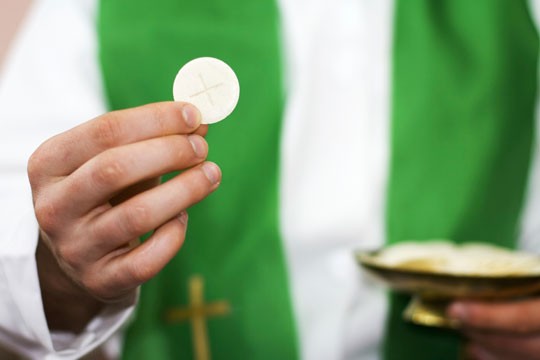The Church teaches that the Eucharist strengthens our charity, which tends to be weakened in daily life, writes Cathal Barry
The Church teaches that Holy Communion “augments” the recipient’s union with Christ.
“The principal fruit of receiving the Eucharist in Holy Communion is an intimate union with Christ Jesus,” the Catechism of the Catholic Church states. Indeed, the document notes that the Lord said: “He who eats my flesh and drinks my blood abides in me, and I in him.” (Jn 6:56)
Life in Christ has its foundation in the Eucharistic banquet: “As the living Father sent me, and I live because of the Father, so he who eats me will live because of me.” (Jn 6:57)
The Church teaches that what material food produces in bodily life, Holy Communion “wonderfully achieves” in spiritual life.
Communion with the flesh of the risen Christ “preserves, increases, and renews the life of grace” received at Baptism, the Catechism of Catholic Church states.
“This growth in Christian life needs the nourishment of Eucharistic Communion, the bread for our pilgrimage until the moment of death, when it will be given to us as viaticum,” the key teaching document says.
Sins
The Church teaches that the body of Christ received in Holy Communion is “given up for us” and the blood drank is “shed for the many for the forgiveness of sins”.
The Catechism states that as bodily nourishment restores lost strength, so the Eucharist strengthens our charity, which tends to be weakened in daily life; and this living charity wipes away venial sins.
By the same charity that it enkindles in the recipient, the Church teaches that the Eucharist “preserves us from future mortal sins”.
“The more we share the life of Christ and progress in his friendship, the more difficult it is to break away from him by mortal sin. The Eucharist is not ordered to the forgiveness of mortal sins – that is proper to the sacrament of Reconciliation. The Eucharist is properly the sacrament of those who are in full communion with the Church,” the Catechism notes.
The Church teaches that those who receive the Eucharist are “united more closely to Christ”. “Through it Christ unites them to all the faithful in one body – the Church. Communion renews, strengthens, and deepens this incorporation into the Church, already achieved by Baptism. In Baptism we have been called to form but one body,” the Catechism states.
The Church also teaches that the Eucharist commits recipients to the poor.
“To receive in truth the Body and Blood of Christ given up for us, we must recognise Christ in the poorest, his brethren,” the Catechism states.


 Cathal Barry
Cathal Barry
